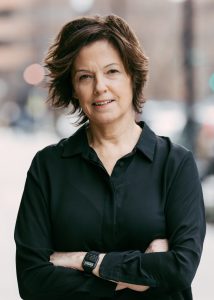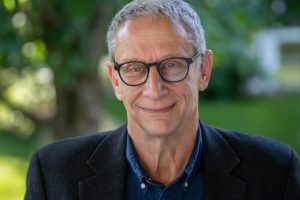
If there was a book out this year titled “Perseverance,” it would be authored by Lois Cahall, founder of the Palm Beach Book Festival and a former newspaper reporter.
Hitting its 10-year milestone, the festival, scheduled for Saturday, March 16, at Florida Atlantic University, brings New York Times-bestselling authors to South Florida and has endured, despite challenges.
Canceled in 2020 because of the COVID-19 pandemic, followed by two years of virtual festivals, and a one-off in 2023, the festival also has faced new issues each year – including the Hollywood writer’s strike (limiting celebrity authors) and the politicization and banning of book titles, especially in Florida.
“Whoever thought I’d say there is danger in book festivals?” Cahall says.
But persevere she did, since the inception of the festival at the Norton Museum of Art in April 2015, with lines out the door and a packed house. She remembers author James Patterson turning to her and saying, “You’re in it now, kid!”
“He wasn’t kidding,” she says. “In 10 years, a lot has changed. Each year is a new experience and brings new issues.”
Cahall credits board member and former Oprah Book Club editor Leigh Haber for being with her every step of the way since the second year; Marta Batmasian, of the James and Marta Batmasian Family, who helped find a home for the festival at FAU and helps keep it alive; and Michael Horswell and Polly Burks of FAU.
The lineup for this year’s festival includes Pulitzer Prize-winning journalist Anne Hull, author of a memoir titled Through the Groves; journalist and author David Finkel, author of An American Dreamer: Life in a Divided Country; Lauren Groff, a three-time National Book Award finalist and New York Times–bestselling author of The Monsters of Templeton, Arcadia and Fates and Furies; award-winning filmmaker Barry Sonnenfeld with his memoir, Call Your Mother; and Lifetime Honorée Joyce Carol Oates, whose latest book is Zero-Sum: Stories, a collection of four stories.
Cahall strives to offer a mix of eclectic variety.
“I like to mix a bit of controversy with a bit of icon-ness (Oates), throw in incredible novelists and a bit of good, old Hollywood glamour,” she says.
Hull, 62, a fifth-generation Floridian who grew up amid the orange groves of Central Florida, came to writing by chance.
After dropping out of college, she had taken a job selling shampoo for Revlon when a friend recommended her for a clerical job at the St. Petersburg Times.
“I threw away my skirt and company car and went to answer phones on the sports desk,” she says. Six months later she was promoted to answering phones on the city desk and her writing career began after writing a four-paragraph record review.
“It was a stroke of luck,” Hull remembers. “The ‘St. Petersburg Times’ was one of the best newsrooms in the country and a great training ground.”
She began writing fashion features, which led to a gig as a national correspondent. In 2000, she left St. Petersburg for The Washington Post. She wrote about low-wage workers, rural voters, immigration, LGBT teenagers coming out in the Bible Belt, Hurricane Katrina and soldiers back from the war in Iraq.
The Post received the 2008 Pulitzer Prize for Public Service for her work in exposing mistreatment and poor living conditions for wounded veterans at Walter Reed Army Medical Center.
In 2017, she left the Post and moved to Berlin to work on Through the Groves, her memoir. Not used to writing in the first person, Hull found it slow going and arduous.
“It’s a love letter to the past,” Hull says of the book, which recounts her youth in a now-vanished rural Florida. “I yearn to revisit that disappearing time and place — the egrets and sandhill cranes, how fragrant and lush the orange groves were — all the natural beauty.”

Like Hull, David Finkel, 68, is a Pulitzer Prize awardee and a MacArthur Foundation “genius” grant recipient who also got his start at the St. Petersburg Times. A journalist and author, his works include An American Dreamer: Life in a Divided Country, The Good Soldiers and Thank You for Your Service, which became the basis for a feature-length DreamWorks Pictures film in 2017.
He is currently an editor and writer for The Washington Post.
An American Dreamer recounts the story of Brent Cummings, a 28-year Army veteran who returns from Iraq to find he must navigate the cultural and societal upheaval taking place, and continues the story Finkel began in The Good Soldiers. That book was a New York Times best-seller in 2009.
Finkel met Cummings in 2007 when he was embedded with his Army infantry battalion in Baghdad and the two have remained in touch. Finkel began reporting on him and his family again in 2016 for his current book.
With a polarized country and a loud news drumbeat, Finkel searched for a way to write a compelling story.
“By nature, I’m a storyteller,” he says. “I believe in the power of a good story.”
“Readers will find themselves in Brent,” says Finkel. “We’re all baffled by what’s going on and his story reveals a personal answer.” (You will have to read the book to find that answer.)
In college, Finkel “found his people” (“smart and awkward”) at the University of Florida school newspaper, The Florida Alligator.
For this book, Finkel filled 100 notebooks with notes and observations before he sat down to write. “It all starts with a question,” he says. “What’s going on here?”
Eventually, he says, the story takes shape in his mind. Once the research and reporting are complete and an ending emerges, he creates an outline, starts at the beginning and keeps writing until he’s told the story he wants to tell.
As for future projects, he says, as someone with Florida roots and family in South Florida, he is looking forward to good weather for his visit to Boca Raton for the Book Festival in March.
If You Go
The Palm Beach Book Festival will take place Saturday, March 16, from 11 a.m. to 4 p.m., in the University Theatre, 777 Glades Road, Boca Raton campus. Tickets are $15 per session and can be purchased at www.fauevents.com or by calling 561-297-6124. A package ticket is available for $50. Book signings will follow each session and books will be available for purchase throughout the day. Lunch is also available for pre-purchase at www.fauevents.com. Parking is included with cost of admission. FAU student, faculty and staff tickets are free.